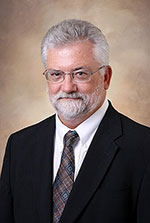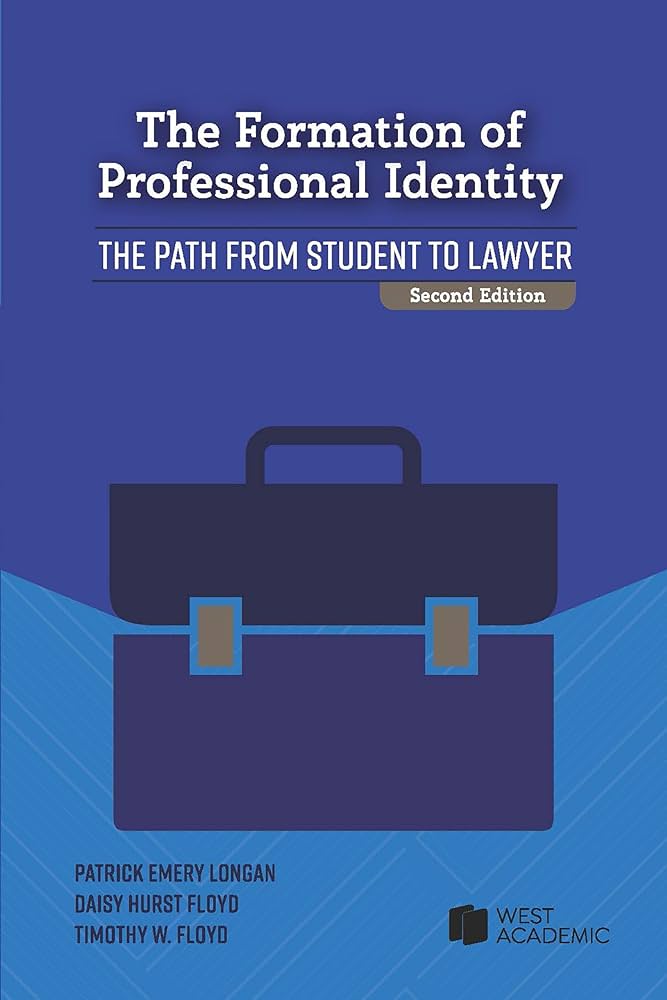By:
Patrick Longan
W.A. Bootle Chair in Ethics and Professionalism
Daisy Hurst Floyd
University Professor of Law and Ethical Formation
Timothy W. Floyd
Tommy Malone Distinguished Chair in Trial Advocacy
Director of Experiential Education
At Mercer, we teach a required three-credit course on professional identity as part of the first-year curriculum. The course has been in place since 2004.
Our first-year course has many moving parts. We try to answer three questions about professional identity – what kind of professional identity a lawyer should have, why would anyone strive to have such an identity, and how one deploys professional identity in everyday practice and in more complex situations. We use a virtue ethics approach, and we teach the students that the professional identity of a lawyer should include six virtues: competence, fidelity to the client, fidelity to the law, public spiritedness, civility, and practical wisdom. We link the six virtues to the public purposes of lawyers. The course addresses motivation by exposing the students to the intrinsic rewards of the right kind of professional identity development. The course is structured to reinforce the good habits and dispositions that the students will need in everyday practice, and we work through problems and exercises to get the students started on implementing their professional identities in complex and uncertain situations. These are ambitious goals, and each part of the course is designed to accomplish one or more of them.
We begin with a series of presentations that give the students the basic structure, vocabulary, and foundational knowledge that they will need in the other parts of the course. These presentations track chapters in our book, The Formation of Professional Identity: The Path from Student to Lawyer [note: a second edition is in the works]. They introduce the students to virtue ethics and cover the six virtues in depth. We explain why it is so important for clients, the courts, and the public that lawyers acquire and deploy them – why the virtues matter to others. The presentations also introduce the students to why it will matter to them personally if they develop a professional identity that internalizes the six virtues. We expose them to research that links the six virtues to a lawyer’s sense of satisfaction and fulfillment in the profession. Finally, the presentations touch on some of the obstacles they will encounter as they try to deploy the virtues in practice, and we begin introducing the students to strategies for overcoming those obstacles and implementing an internalized commitment to their professional identities.
After the first few introductory presentations, we begin a series of weekly section meetings. At Mercer, each entering class is divided into sections of approximately twenty-five students. By the time we encounter them for their course on professional identity in the second semester of the first year, the sections usually have formed into cohesive and mutually supportive groups. The small size, and sense of trust, are important to the success of the section meetings in the professional identity course.
Each section meets once per week for twelve weeks for discussions led by one or more of us. The first three of the section meetings are essentially “warm-up” exercises in which the students read about lawyers who may or may not have deployed the right virtues in particular situations. The students “sit outside” the problems and use their new-found vocabulary about fidelity to the client, etc., to critique or praise the lawyers’ conduct. We also begin in these first two weeks to explore motivations – for example, what could have caused a lawyer to fall short of what is expected.
The next four discussions are more challenging, as the students move into “role,” as members of the state bar board of governors, as members of the state bar rules committee, and as members of the board to determine character and fitness. Here, the students are challenged to act with the virtue of public spiritedness. They debate and vote on proposals relating to access to justice, discrimination and harassment in the profession, and character as a qualification for practice. Students begin to appreciate the significance of the virtues and the difficulty of deploying them when they are first put in role, pretending to be lawyers, when they can no longer sit back “outside the problem” as students.
The next four of the section meetings involve our “practical wisdom exercises.” These problems build in complexity and call upon the students to chart a course in circumstances where more than one virtue is relevant, where the virtues might conflict, and where there is uncertainty. They cannot do that without using the “master virtue” of practical wisdom, and these problems require them to practice doing so. For example, in one problem a defense lawyer must decide whether to inform opposing counsel in a personal injury case that the plaintiff has a serious injury about which the plaintiff is unaware.+ All of these problems require the students not only to know the virtues but also to recognize conflicts among them and obstacles to their implementation while they devise and argue for the wisest action. Although there are certainly some wrong answers, there is never one “right” answer. Many students find this kind of exercise initially uncomfortable. This is where the close-knit nature of the sections is important, because undertaking these exercises with trusted classmates is easier than it would be with strangers.
The final section meeting is a more traditional classroom discussion of a reading that all of the students have completed. For the last few years, we have had the students read Bryan Stevenson’s Just Mercy and asked them to discuss the book in light of what they have learned about professional identity, with particular focus on their roles in addressing systemic injustice. As a “capstone” to this part of the course, we have found that Just Mercy works very well.
The section meetings in many ways are the heart of our course. The students must apply what they have learned about the six virtues to concrete situations. They must encounter and seek to overcome obstacles to being the kind of lawyer they hope to be. They learn that not everyone approaches issues the same way. It is hard work, and the students do not always leave happy. But we often observe them continuing to discuss the problems with their classmates as they are leaving class, and that is when we know we are making progress.
Our students also complete a series of thirteen weekly writing assignments. Many require the students to reflect on the problem from the week before, on their working group discussions, and on the section meetings. Others provide prompts to which the students must respond. For example, we ask the students early in the semester to reflect on their own personal values and to describe how those values mesh with the six virtues of the professional lawyer. It is crucial to require the students to slow down and reflect upon what they are learning. They have many demands on their time, and in a pass/fail class like ours the temptation to rush through the assignments will be too great if we do not force them to reflect. Once the students commit to the exercise, however, the results can be astounding. The student’s growing understanding of professional identity becomes obvious as the semester progresses.
Reading, discussing, and writing about professional identity is crucial, but we have also found that exposing the students to exemplars is powerful reinforcement of the lessons in the books and the classrooms. We do this in two ways. First, we bring in a series of lawyers and judges to be interviewed in front of the class about their lives and careers, with enough time for students to ask questions and introduce themselves personally. This is our “Inside the Legal Profession” series. The guests represent a cross-section of the profession and are also diverse in terms of race, gender, sexual orientation, and age. Many of the interviews have been recorded and uploaded to YouTube.
The second way in which we expose students to exemplars is that we assign each working group to meet in person off campus with a local lawyer or judge near the end of the semester. The mission is to discuss life in the law, including the joys and challenges of different parts of the profession. The interviews are scheduled for one hour each but often last much longer. Students frequently report that this is their favorite part of the course. The lawyers and judges often comment on the high quality of the discussions.
The importance of exemplars cannot be overstated. Our students respect their professors, but the students don’t want to be professors. They want to be lawyers, and they are hungry for direct contact with people who are living the lives they are trying to envision for themselves. Especially after they have been through difficult discussions of the obstacles to the cultivation and deployment of the right kind of professional identity, students often find these meetings refreshing and inspirational. A happy and fulfilling life in the law seems more attainable because they have met with someone who has done it, and students also report that they have felt personally welcomed into their new profession by the willingness of lawyers to spend time with them and offer to help them in their development.
As we noted above, every part of our course serves one or more of our purposes. The lectures provide knowledge about what a lawyer’s professional identity should be and motivation to cultivate such an identity. The section meetings reinforce the virtues and equip the students to overcome obstacles and implement their professional identities. They also provide practice for exercising the master virtue of practical wisdom. The reflective writings help the students to internalize the virtues, while the exemplars deepen their understanding of professional identity and provide further motivation. We are grateful for the opportunity to teach a required first-year course focused on virtue ethics and professional identity, and we are happy to share our experience with the PIF community. We also welcome all suggestions for improving the course.
More information about the course is available at https://law.mercer.edu/academics/centers/clep/education.cfm.
* This post is adapted from an article the authors published several years ago: A Virtue Ethics Approach to Teaching Professional Identity: Lessons for the First Year and Beyond, 89 UMKC Law Review 645 (2021).
+ The problem is based upon the famous case of Spaulding v. Zimmerman, 236 Minn. 346, 116 N.W.2d 704 (1962).

Patrick Longan
is the William Augustus Bootle Chair in Ethics and Professionalism in the Practice of Law at Mercer University School of Law
and is Director of the Mercer Center for Legal Ethics and Professionalism

Timothy Floyd is the Tommy Malone Distinguished Chair in Trial Advocacy and Director of Experiential Education

Daisy Floyd is the University Professor of Law and Ethical Formation and former Dean at Mercer University School of Law.




